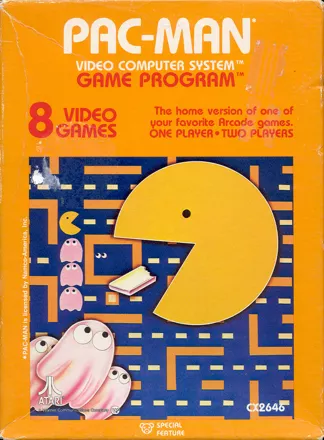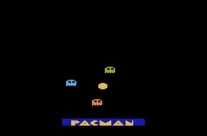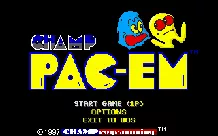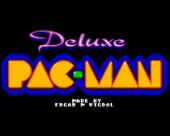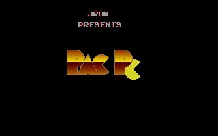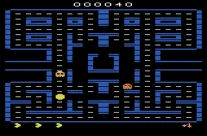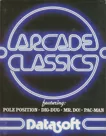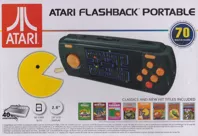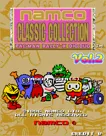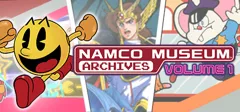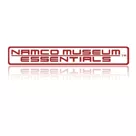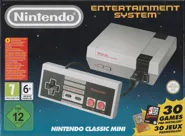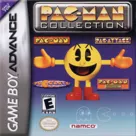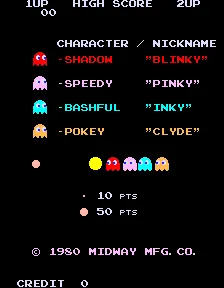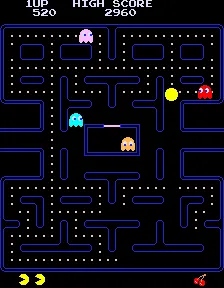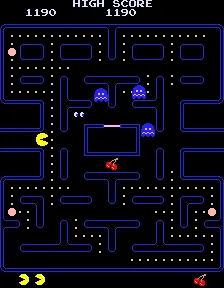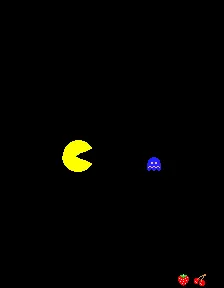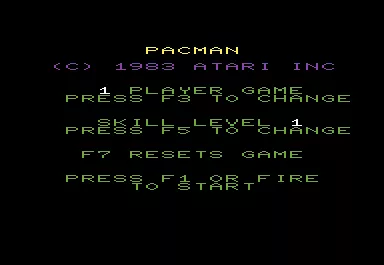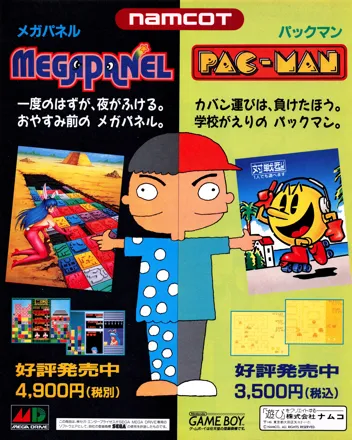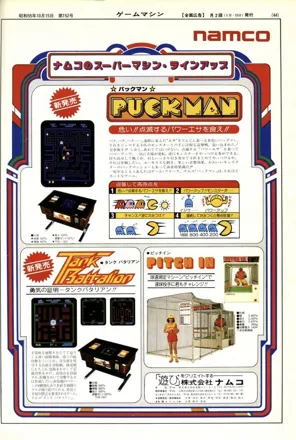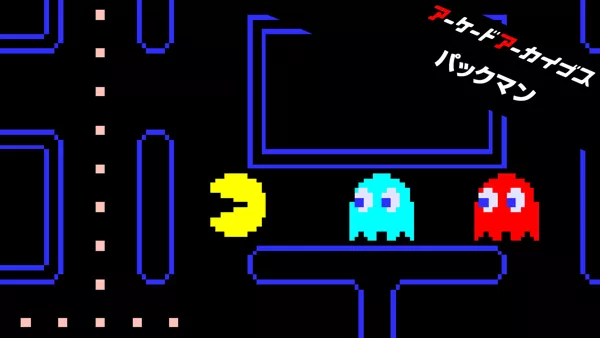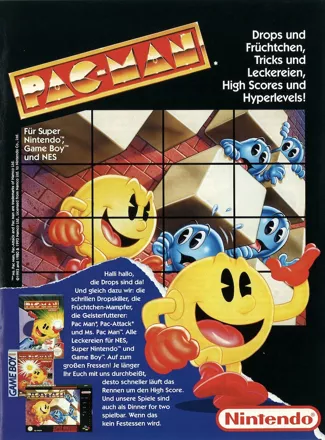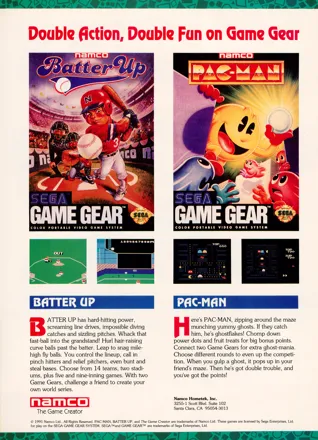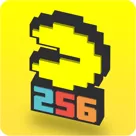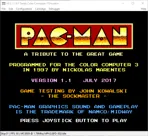Pac-Man
- Pac-Man (1981 on Wang 2200)
-
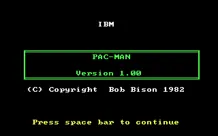 Pac-Man
(1982 on
DOS)
Pac-Man
(1982 on
DOS)
-
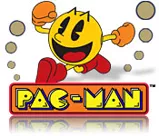 Pac-Man
(2009 on
Windows)
Pac-Man
(2009 on
Windows)
-
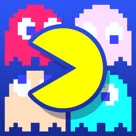 Pac-Man
(2013 on
Android,
iPhone,
iPad)
Pac-Man
(2013 on
Android,
iPhone,
iPad)
Description official descriptions
One of the most popular and influential games of the 1980's, Pac-Man stars a little, yellow dot-muncher who works his way around to clear a maze of the various dots and fruit which inhabit the board.
Pac-Man's goal is continually challenged by four ghosts: The shy blue ghost Bashful ("Inky"), the trailing red ghost Shadow ("Blinky"), the fast pink ghost Speedy ("Pinky"), and the forgetful orange ghost Pokey ("Clyde"). One touch from any of these ghosts means loss of a life for Pac-Man.
Pac-Man can turn the tables on his pursuers by eating one of the four Power-Pills located around the maze. During this time, the ghosts turn blue, and Pac-Man can eat them for bonus points. This only lasts for a limited amount of time as the ghosts' eyes float back to their center box and regenerate to chase after Pac-Man again.
Survive a few rounds of gameplay, and be treated to humorous intermissions starring Pac-Man and the ghosts.
Spellings
- Pac Man - Alternate Apple II media spelling
- アーケードアーカイブス パックマン - Japanese Switch spelling
- パックマン - Japanese spelling
- 小精靈 - Chinese spelling (traditional - Taiwan)
- 食鬼 - Chinese spelling (traditional - Hong Kong)
Groups +
- Arcade Archives series
- Arcade Game Series
- Classic NES / Famicom Mini / NES Classics releases
- Games involved in legal disputes
- Games made into TV series
- Games referenced in literature
- Games referenced in movies
- Genre: Labyrinth / Maze
- Pac-Man games (licensed)
- Video games turned into board / card games
Screenshots
Promos
Videos
See any errors or missing info for this game?
You can submit a correction, contribute trivia, add to a game group, add a related site or alternate title.
Credits (Arcade version)
4 People
| Planning |
|
| Hardware |
|
| Programming |
|
| Sound |
|
Reviews
Critics
Average score: 62% (based on 82 ratings)
Players
Average score: 3.7 out of 5 (based on 522 ratings with 13 reviews)
It Sucks that it's based on Pac-man, but it's not a bad game.
The Good
The game it self is pretty decent. It's still fun to play, and, to me, I think the escapes on the top and bottom of the mazes are more useful than the arcade! It's alot easier to dodge the ghosts, since they move in a pre-selected pattern(for the most part). It's a OK game through and through.
The Bad
The main reason that people rip on the 2600 version of Pac-Man so much, is that the game only barely resembles the actual arcade game. The game was clearly rushed, and because of this, the ghosts flicker too much, almost constantly, and there is no longer fruit in the middle of the maze, it's a "Vitamin".
The Bottom Line
Well, I'll admit, it sucks that the game is based off of the classic arcade game, but it's still a playable, and decent game on it's own.
PROS
+Fun to play.
+More Useful Exits.
+Easier to dodge ghosts.
CONS
-- Rushed.
-- Ghosts flicker too much.
-- It's based on the arcade Pac-Man
THE VERDICT: 6 "Vitamins" out of 10
Atari 2600 · by JohnLennon224 (13) · 2008
Hey look everybody, it's the Anti-Pac-Man
The Good
Pac-Man must eat all dashes in a maze of corridors, while avoiding the four ghosts. If he does collide with one ghost, he will lose a life. However, if he eats the squares that hide in each corner of the maze, the ghosts will turn blue, allowing him to gobble them up. He must do this in a small amount of time before the ghosts turn back to normal. If the ghosts are too much for him, he can go through the escape tunnels that are located at the top and bottom of the screen. Once all the dashes have been eaten, Pac-Man is warped to the next maze.
The only good thing that I can say about Pac-Man for the Atari 2600 is that it at least stars one of my favorite characters ever since he was born in the eighties.
The Bad
This was supposed to be the flagship title for the best 8-bit system for its time. There was much hype surrounding the Atari 2600 version. When gamers got a chance to play it, they expected it to be faithful to the original game as much as possible. Instead, what they got was a rather poor conversion of the game which suffered from many flaws in its design.
Let's start with the main characters. As you expect, Pac-Man looks like a filled yellow circle with a slice cut out of him. However, he is a bit blocky and looks like a moving wrench with an eye. When he travels north or south throughout the maze, his head does not turn vertically. It is as if he does not look for corners at all. In the original game, the ghosts (Blinky, Pinky, Inky, and Clyde) have different colors so that you can tell them apart. In the A2600 version, however, all the ghosts are the same color so you can't tell them apart. To me, it looks like Atari used only the one ghost, duplicated him three times, and selected random paths for them. To make matters worse, the ghosts flicker badly. Due to the A2600's limitations, only one ghost could be displayed at a time.
Now, gamers who have played other versions of Pac-Man before they had the chance to play the A2600 version will know that the first paragraph in “The Good” section is incorrect. It is too bad that it is true for this port, as Pac-Man actually gobbles up dots, not dashes. He also eats power pellets, not squares. One thing that I forgot to mention in that paragraph is that the fruit that appears randomly in the middle of the screen is indeed a rectangle, but according to the back cover, it is a “video wafer”. The game has a blue background and the maze is colored orange.
Sound-wise, the A2600 port does not even come close to the sound used in the coin-op version. Both the start-up sounds and Pac-Man's dying sounds are bad, and the A2600's sound system only emits a series of beeps when Pac-Man gobbles up the dashes.
The Bottom Line
Pac-Man for the Atari 2600 is a conversion with many flaws, which happen as a result of Atari rushing to get the game released in time for the 1981 christmas season, as well as the lack of testing. This game, along with E.T., is partially to blame for the 1983 video game crash. I'm surprised that the A2600 version of Ms. Pac-Man was given the go-ahead, after this disastrous port was made.
Atari 2600 · by Katakis | カタキス (43085) · 2006
Pac-Man, in case you didn't know about it
The Good
The two words, "Pac-Man," immediately brings to mind the maze genre. It changed the name of an entire genre to "Pac-Man clone". If that's not an indication of how popular it was, I have no idea what is. Wait, maybe I do. Commercials, sequels, merch, ports, multiple TV shows... Pac-Man is everywhere. Namco has been milking this cash cow for nearly 40 years and it's not running dry anytime soon. It's not a deep game. It's not the absolute most fun game you'll ever play. But it's history, and that matters.
The Bad
Literally two-dimensional gameplay. Nearly no depth makes replaying it more of a time killer than anything else. It's fun if you haven't played it in a while, but let's be real, everyone in the English-speaking world has probably played Pac-Man in some form over the past 365 days at any given time.
The Bottom Line
It's Pac-Man. I don't know why I'm reviewing this, it's literal Pac-Man in every sense. You don't need a review, because you have and inevitably will play it.
NES · by subsonick · 2024
Discussion
| Subject | By | Date |
|---|---|---|
| Pac-Man Atarisoft / Datasoft releases | S Olafsson (74503) | May 2, 2016 |
| Channel F version should be split | Игги Друге (46636) | Feb 1, 2014 |
| Famicom Mini series: (alternate) titles | yenruoj_tsegnol_eht (!!ihsoy) (2596) | Aug 10, 2012 |
Trivia
1001 Video Games
The Arcade version of Pac-Man appears in the book 1001 Video Games You Must Play Before You Die by General Editor Tony Mott.
Apple II version
The Apple II version was originally released as Taxman by H.A.L. Labs, but after threatening a lawsuit, Atari turned around and bought the program to release as their Apple II version of Pac-Man with slight changes.
Atari 2600 versions
When Pac-Man was released for the Atari 2600, over a million units were sold. But because of Hardware limitations, it did not look like the arcade one. The ghost were the same color, you had to eat square blocks instead of dots, and the whole image just didn't stand up. Although this helped gained Atari some bucks, it tarnished its reputation, which would follow them for years to come.
Due to copyright issues, Ébivision never released their Atari 2600 version of Pac-Man for public sale. A copy, with label and box, was given away to Jeff Rothkopf for being the first person to find the hidden level in Alfred Challenge.
Book
Schiffer Books has released a Pac-Man collectibles value guide.
Cancelled Colecovision port
You might notice that there is a certain system missing at the top of this page, namely the Colecovision. This is particularly strange considering the fact that a working Atarisoft prototype of Pac-Man for Colecovision, complete with working AI, graphics and sound, has been discovered and dumped. One can only guess that the release was cancelled by looking at the copyright date of 1983, coinciding with the big video game crash.
Cartoon
During the height of its popularity, Pac-Man had a Saturday morning TV cartoon that focused on Pac-Man, Ms. Pac-Man, and (in later seasons) Super Pac-Man. The show lasted for several seasons, and also had a Christmas special. The later game, Pac-Land, based its visual style off of this series.
Cereal
Pac-Man was popular enough to have a breakfast cereal based on the game. The cereal was a combination of cereal "dots" and marshmallows based on the characters. The first marshmallows were Pac-Man (yellow), Inky (blue), Blinky (red), Pinky (pink) and Clyde (orange). As time went on, Ms. Pac-Man and larger Super Pac-Man marshmallows were added.
The tag line was "You can do the Pac-Man", with kids stretching their arms out and clapping to emulate Pac-Man's eating motions.
Commodore VIC-20 version
In Japan HAL Laboratory held the home computer rights for Pac-Man. They made the original VIC-20 conversion which was released by Commodore over there in 1981. To get around the licensing restrictions, Commodore released the game as "Jelly Monsters" in the US and Europe a whole year before the official Atari VCS version hit the market, much to the chagrin of Atari the license holder for those regions. Atari filed a lawsuit which they won, removing Jelly Monsters from the shelves. In 1983 Atarisoft released their own, largely considered inferior VIC-20 version.
Development
As the story goes, one of the Namco's designers (Namco being the company that created the original arcade version) ordered a whole pizza for himself. After eating one of the slices, he looked at the pizza again. And thus, Pac-Man was born.
Ghosts
The four enemy ghost characters, Oikake, Machibuse, Kimagure and Otoboke, from the original Japanese version of Pac-Man were thoughtfully and descriptively renamed to match their in game behavior. Shadow (red), Speedy (pink), Bashful (blue) and Pokey (orange) are the westernized names of the four ghosts. Additionally they also received new nicknames, Blinky, Pinky, Inky and Clyde. Only Pinky has the same nickname in both Japanese and western versions of Pac-Man.
Innovations
According to www.classicnesseries.com, Pac-Man was the first character in a video game.
PC version
It's clear that the advertising execs who wrote the advertising blurb for the PC port hadn't played the game seriously. The ad blurb calls the ghosts "goblins", and erroneously describes gameplay.
In fact, of all Atarisoft PC conversions, this was one of the more shoddy ones as the maze's proportions are out of whack. In addition, the programmer was lazy--the entire maze is drawn with the INT 10 set pixel function, which is why it's so slow.
References
During the later levels, the special item in the middle of the level (cherry, strawberry, apple, etc.) is a Galaxian. The Galaxian comes from an earlier Namco game of the same name.
References to the game
Pac-Man is referenced in the Futurama episode Anthology of Interest II. The episode consists of three shorts; one of which involves Fry asking the "what-if" machine "what if life was more like a video game." In the short, aliens invade the earth; then Fry and his friends seek the help of Secretary of Defense Colin Pac-Man. Also in the short, Fry and friends have to navigate a Pac-Man styled maze.
Sales
It is estimated that Pac-Man -- both in its coin-op arcade and console incarnations -- has been played over 10,000,000,000 times.
Song
Pac-Man was the first video game to inspire a popular pop song, which was played on the radio, had a full-length record and a single. The song in question was Buckner and Garcia's Pac-Man Fever.
Rapper Lil Flip's hit song, Game Over uses sound effects from Pac-Man. But the bad thing is Lil Flip never got permission from Namco to use the sounds and was later sued.
Title
When the game first appeared in Japanese arcades in 1979, it was called Puck-Man. When Midway ported to America, the company decided to re-name it Pac-Man because they were concerned that English speaking players might vandalize the "Puck" to spell a certain swear word.
Pac-Man's name is derived from the Japanese adverb 'paku' used to describe gaping, biting or snapping mouths. 'Paku' is also an onomatopoeia modelled after the smacking sound of lips. This could explain the sound Pac-Man emits when moving around.
Xbox 360 version
The Xbox Live! Arcade version stays true to the original gameplay and look, with the addition of improved graphics and sounds, leaderboards and achievements. The game itself was already included as a secret in Ridge Racer 6.
Awards
- Electronic Gaming Monthly
- November 1997 (Issue 100) - ranked #89 (Best 100 Games of All Time) (Genesis / SNES versions)
- November 1997 (Issue 100) - ranked #11 (Titles That Revolutionized Console Gaming) (Arcade version)
- Retro Gamer
- October 2004 (Issue #9) – #10 Best Game Of All Time (Readers' Vote)
- The Strong National Museum of Play
- 2015 – Inducted into the World Video Game Hall of Fame
Information also contributed by Игги Друге, gamewarrior, Guy Chapman, J. Michael Bottorff, LepricahnsGold, Little Yoda, Maw, Paul Budd, Robbb, rstevenson, Sciere, woods01 and FatherJack
Analytics
Related Sites +
-
1st Church of Pac-Man
Reverend Shoebox's fansite dedicated to the religion of Pac-Man. -
Abandonia (PC Booter)
downloadable releases; additional material -
AtariAge (Atari 2600)
for Atari 2600: downloadable ROM; scans; manuals; additional material -
AtariAge (Atari 5200)
for Atari 5200: downloadable ROM; scans; manuals; additional material -
AtariMania (Atari 2600)
for Atari 2600: database; downloadable releases; artwork; additional material -
AtariMania (Atari 5200)
for (Atari 5200): database; downloadable releases; artwork; additional material -
AtariMania (Atari 8-bit)
for Atari 8-bit: database; downloadable releases; artwork; additional material -
Bucker and Garcia Official Pac-Man Fever Site
The official website of the artists who created the "Pac-Man Fever" song from the early '80's. -
DJ Oldgames (PC Booter / C64)
for PC and C64: downloadable releases; additional material -
Game Base 64
for C64: Downloadable links, Database, Music, Emulation, Frontends, Reviews and Articles -
Game Oldies (Nintendo Game Boy)
for Nintendo Game Boy: online emulation of game -
Game Oldies (Nintendo NES)
for Nintendo NES: online emulation of game -
Game Oldies (SNK Neo Geo Pocket)
for SNK Neo Geo Pocket: online emulation of game -
Game Oldies (Sega Game Gear)
for Sega Game Gear: online emulation of game -
Internet Archive (ZX Spectrum)
for ZX Spectrum: downloadable release; online emulation of game; additional material -
Lemon 64
for C64: games, reviews and music -
MSX Generation
for MSX: catalogue; cover art; additional material -
My Abandonware (PC Booter)
for DOS and C64: downloadable releases; online versions; additional material -
SMS Power! (Game Gear)
for Game Gear: releases info; credits; box text; additional material -
The International Arcade Museum
extensive information about the arcade game machine -
The Pac-Man Dossier
a very detailed and technical study on all aspects of the original arcade game -
The Pac-Page
Fansite dedicated to the many games of the Pac-Man family. -
Virtual Apple 2 - Online disk archive
for Apple II: online emulation of game (for Windows and Mac); downloadable releases; additional material -
World of Spectrum
for ZX Spectrum: downloadable releases; additional material; player reviews; magazine references -
X360A achievement guide
X360A's achievement guide for Pac-Man.
Identifiers +
Contribute
Are you familiar with this game? Help document and preserve this entry in video game history! If your contribution is approved, you will earn points and be credited as a contributor.
Contributors to this Entry
Game added by Trixter.
Game Boy Advance, Neo Geo Pocket Color added by Corn Popper. Atari 2600, NES, Commodore 64, Intellivision added by PCGamer77. Wii U added by Michael Cassidy. Nintendo 3DS added by CrankyStorming. Nintendo Switch added by Rik Hideto. Sharp MZ-80K/700/800/1500, FM-7, Sharp MZ-80B/2000/2500, Sharp X1 added by Infernos. PC-8000 added by OmegaPC777. Windows Phone, Xbox One, PlayStation 4, Xbox 360, Wii added by Sciere. Palm OS, Sharp Zaurus, Android, Windows added by Kabushi. MSX added by Martin Smith. BlackBerry added by Pseudo_Intellectual. Antstream added by lights out party. PC-88 added by Terok Nor. Arcade added by The cranky hermit. TI-99/4A, Apple II, ZX Spectrum, VIC-20, Atari 8-bit, Atari 5200 added by Servo. PC-6001, Game Gear added by Игги Друге. iPhone added by Ben K. PC-98 added by j.raido 【雷堂嬢太朗】. Game Boy added by Jim Fun.
Additional contributors: Jeanne, Guy Chapman, Alaka, vileyn0id_8088, monkeyislandgirl, formercontrib, Patrick Bregger, Starbuck the Third, Plok, S Olafsson, Rik Hideto, LLC, FatherJack, ZeTomes, firefang9212, SoMuchChaotix.
Game added May 26, 1999. Last modified April 1, 2025.


